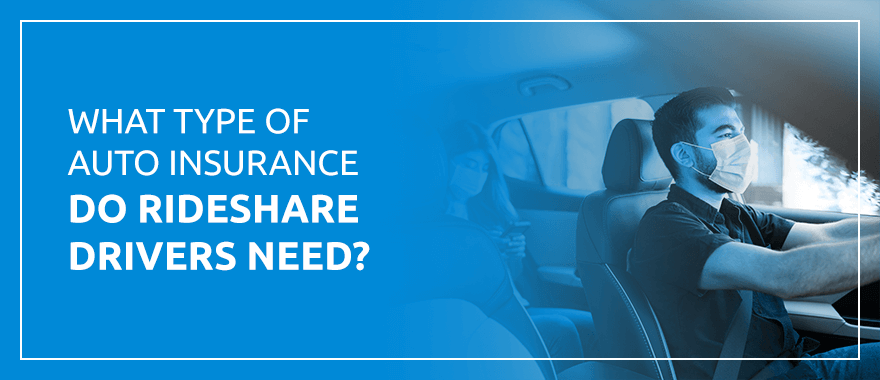
If you work for a rideshare company, like Uber or Lyft, you may need to invest in rideshare auto insurance, even if you already have a personal auto insurance plan. Understanding the unique needs of rideshare drivers and how your insurance provider and rideshare company can protect you can better prepare you for the unexpected while working.
Many companies offer specific insurance coverage to employees to protect them and the company from potential liabilities. However, for rideshare companies like Uber and Lyft, drivers are independent contractors, so they are responsible for covering themselves in an accident.
Because drivers are providing a service that involves other people, they risk paying high costs and getting sued if they get into an accident with passengers in the car. When a passenger gets into an accident while in a rideshare, they submit a claim to the driver’s insurance asking them to cover costs. If the personal insurance doesn’t cover injuries, damages or excess charges, the customer can sue the driver to cover expenses.
Rideshare drivers need rideshare auto insurance to cover unique issues of their job and protect them where their personal plans cannot. Because drivers use their cars to carry out a paid service, they need commercial auto insurance to provide thorough protection for themselves, their vehicles, passengers and other vehicles. Many opt out of commercial insurance, though, because of its higher premiums.
Because personal policies only cover personal use, rideshare drivers can risk losing personal auto insurance coverage if they submit a claim to their provider for an accident while working for a rideshare company. Since ridesharing is a job, accidents would qualify as under commercial policies.
Insurance and rideshare companies break down the rideshare process into four distinct stages to help develop a clear divide between drivers using their cars for personal and professional use. These stages include:
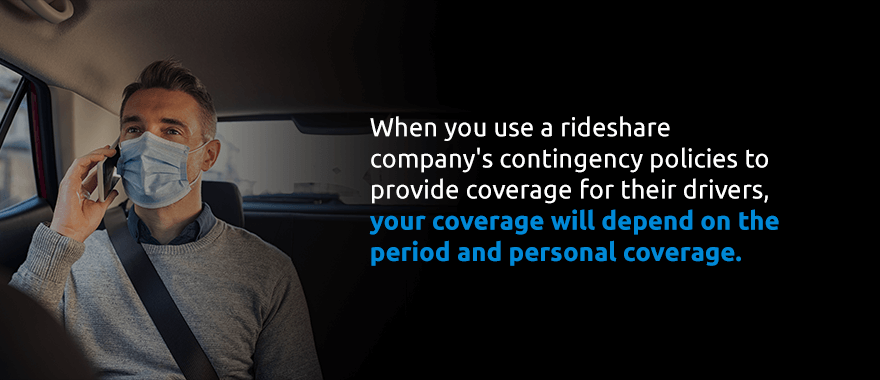
When you use a rideshare company’s contingency policies to provide coverage for their drivers, your coverage will depend on the period and personal coverage. Rideshare companies require you to have a personal coverage plan to qualify for their programs, and you will need to submit a claim with your private insurance first to see what they can cover.
Rideshare companies will only cover what your personal insurance policy can’t. If your provider denies your claim, the rideshare company will help cover costs within their limits. While this can make them helpful tools in covering gaps in your protection, they can lead to people losing their insurance for violating their policies.
When you use a rideshare company’s insurance, your coverage will break down by the period. Period 1 only covers liability and injuries and not personal injuries or damages. Plans typically insure $50,000 in bodily injury for each person and $100,000 in bodily injury for each accident. You will also receive $25,000 protection in property damage per accident.
Periods 2 and 3 link together and offer more comprehensive collision services for drivers, but only if they already have that policy under their personal auto insurance. Policies for these periods will cover up to $1 million in liabilities for each accident and up to the car’s value for comprehensive and collision damages.
Rideshare companies design these policies to function alongside personal or commercial plans. They only go into effect after your insurance denies your claims or when you have additional fees that need to be covered after submitting a claim.
Purchasing rideshare insurance from rideshare companies like Uber and Lyft might seem like a good solution, especially since the cost of commercial auto insurance plans is so high. However, because rideshare insurance requires you to have a personal auto insurance plan and submit a claim there first, it can cause drivers to lose personal coverage for submitting a claim for commercial use under a personal plan.
Rideshare company insurance policies can be challenging because of their limitations as well. Because you need to have auto insurance policies already to use the company’s services, you can only receive coverage for policies you already have. For example, if you need comprehensive coverage, you can only receive this kind of support from your rideshare company program if you have that policy with your auto insurance provider.
Additionally, rideshare companies do not offer coverage if drivers are in an accident in Periods 2 and 3 with an uninsured driver. In this instance, drivers are responsible for covering all fees themselves or with their personal protection plans.
Rideshare endorsements are additional policies offered by insurance providers to rideshare drivers to fill in coverage gaps from personal and rideshare company plans. Endorsements allow drivers to keep their personal auto insurance policies while receiving protection when working. It is always an additional service meant to work alongside other policies, but you can use it either with just your personal policy or with both that and your company’s protection plan.
Endorsements are very similar to a rideshare company’s insurance in that it only provides protection for policies you already have. That means you will need to already have or purchase comprehensive and collision protection if you want your endorsement to cover that as well.
However, rideshare endorsements are a great way to insure your finances and vehicle when working for a rideshare company because they can help drivers avoid losing their personal protection plans. To opt into a rideshare policy, you will need to file a disclaimer with your provider to alert them that you are working for a rideshare company. Since endorsements are add-on services, you will need to use the same endorsement provider as a primary auto insurance provider.
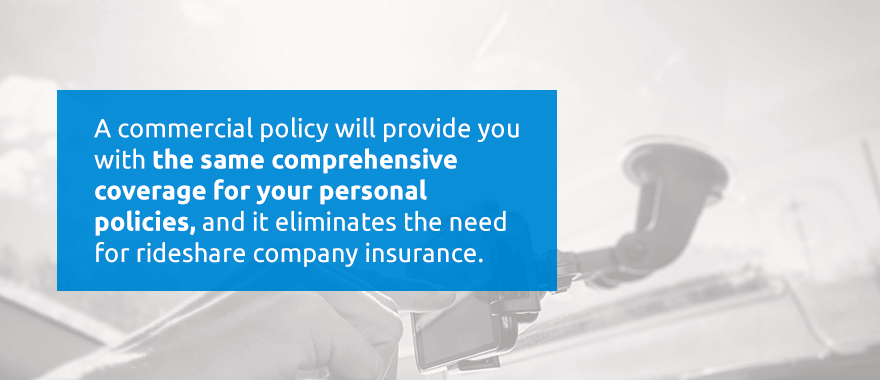
Like how prices will vary depending on each company, endorsement availability will also differ by state. However, insurance providers are the ones who determine which states they provide this service to, so you may only receive an endorsement in your state with specific providers.
Hybrid rideshare insurance is another option for rideshare drivers searching for protection. This type of plan combines your personal and rideshare insurance under one monthly premium, so you can better manage payments.
When you have a hybrid insurance policy and you get into an accident, you won’t need to specify whether you were working or what period you were working in. This policy option is an excellent alternative for people who want something easier to manage than an additional endorsement.
The main difference between endorsements and hybrid policies is what they cover and how you pay. Endorsements are additional coverage designed to fill gaps in existing protection plans and policies, making them more flexible services that you can customize to fit your needs. For example, endorsements may be able to provide coverage for periods that your rideshare company doesn’t protect.
Further, because the endorsements are an added service, you will pay additional fees, whereas you will pay for your rideshare and personal auto insurance on the same bill.
While many insurance providers offer rideshare endorsements and have broad coverage areas that include several states, you may discover your auto insurance provider doesn’t include endorsements in its services. If this is the case, you will need to explore other options.
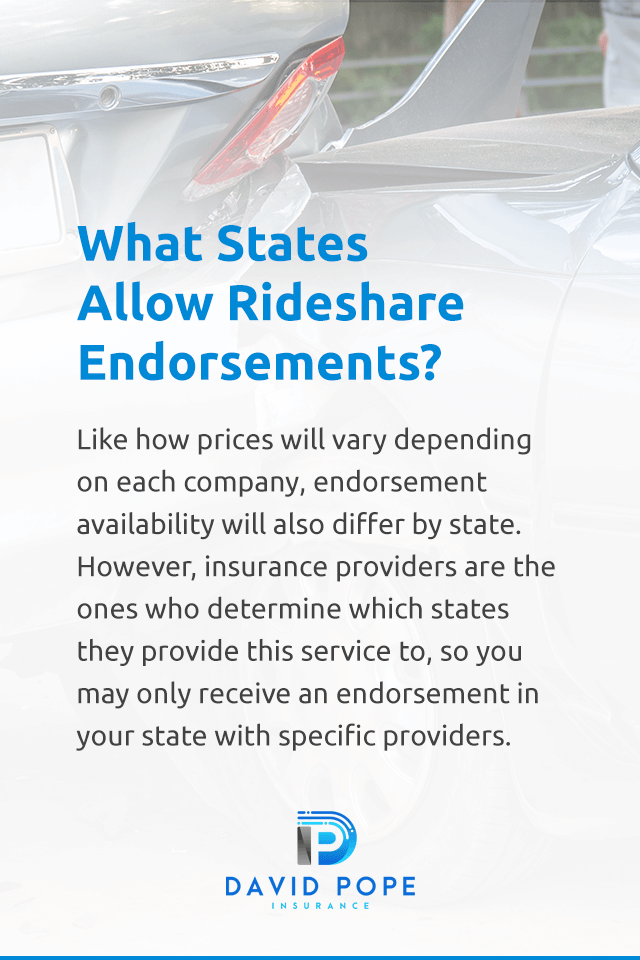
One thing you can consider is investing in commercial auto insurance instead. While commercial auto insurance may be more expensive with higher premiums than rideshare policies, you can expect thorough protection when you are driving for work. A commercial policy will provide you with the same comprehensive coverage for your personal policies, and it eliminates the need for rideshare company insurance.
If you don’t want to pay for the higher premiums accompanying commercial auto insurance, you may need to search for a new auto insurance provider that can offer you all the services you need. Searching for a new provider may take some time and research, but you can ensure you have the coverage you need to protect yourself from hefty repair and legal fees.
If you need to find a new insurance provider to ensure you have thorough protection while working for a rideshare company, you will need to collect many pieces of information in your research, including:
Talking with agents is a great way to get answers about specific policies and other information. Agents can even advise you on which policies they believe will benefit you the most, depending on your needs and budget. However you approach it, your insurance provider research period is critical.
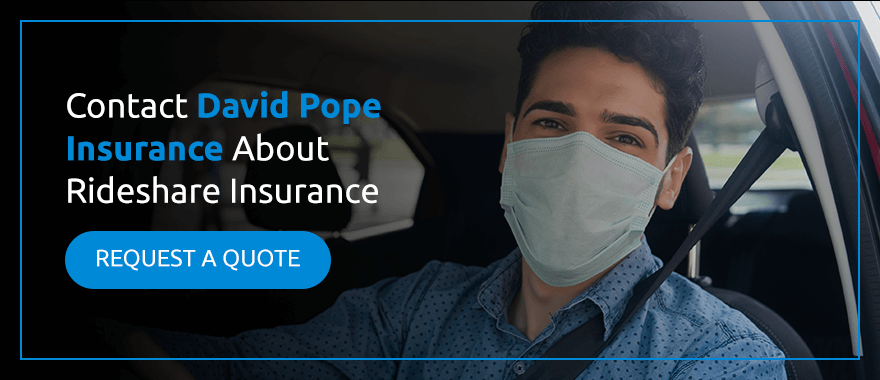
Investing in rideshare insurance is essential for rideshare employees to protect themselves from the costs that can come with getting in an accident while working. Especially if you have a passenger in the car, you may be responsible for covering their medical costs. Having strong rideshare insurance can help protect your finances while working for your rideshare company.
At David Pope Insurance Services, LLC, we dedicate ourselves to finding our customers the lowest rates and the policies that best fit their needs and budgets. With friendly, local agents readily available, you can talk through your needs with someone who understands the industry and your priorities. We accept drivers with all histories for our auto insurance policies, including new or teen drivers, so you can find coverage while on the road.
When you submit a request for a quote with David Pope Insurance, we make it our priority to quickly return information to you, with rates within the day. Contact David Pope Insurance today and discover how we can provide you with auto insurance for rideshare drivers.